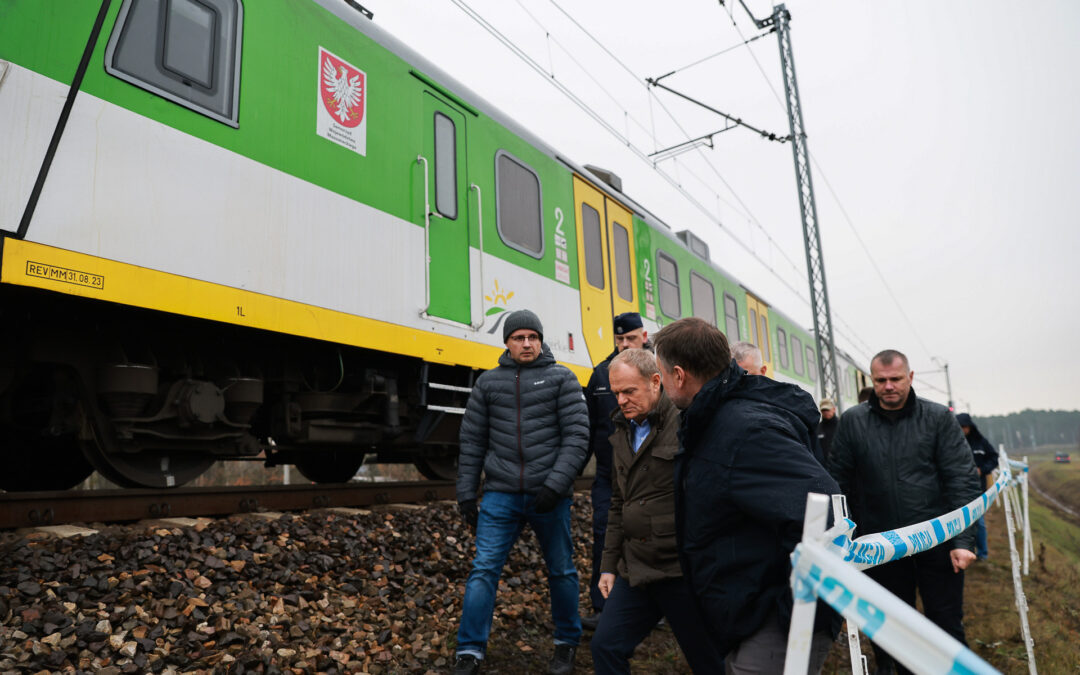Keep our news free from ads and paywalls by making a donation to support our work!

Notes from Poland is run by a small editorial team and is published by an independent, non-profit foundation that is funded through donations from our readers. We cannot do what we do without your support.
This is a breaking news story and may be updated.
The acts of sabotage last weekend that damaged a train line in Poland were carried out by two Ukrainians on behalf of Russia, Polish Prime Minister Donald Tusk has revealed. The pair then immediately fled to Belarus.
“As a result of the investigation, we now know it was the Russian Secret Services that commissioned the blast of the Polish railway and recruited two Ukrainians to do it,” wrote Tusk on social media. “We also know the identities of the perpetrators who immediately fled Poland for Belarus.”
As a result of the investigation, we now know it was the Russian Secret Services that commissioned the blast of the Polish railway and recruited two Ukrainians to do it. We also know the identities of the perpetrators who immediately fled Poland for Belarus.
— Donald Tusk (@donaldtusk) November 18, 2025
Earlier on Tuesday, in a speech to parliament, Tusk revealed that one of the suspects had already previously been convicted in May this year in the Ukrainian city of Lviv for carrying out acts of sabotage. The other, he said, is a resident of Donbas in eastern Ukraine.
Both of the suspects – who Tusk said had been identified but he could not yet name – “entered Poland from Belarus just before the attacks” before subsequently crossing back over the border through the crossing at Terespol. Belarus is a close ally of Russia.
The pair carried out two acts of sabotage, said the prime minister. The first, which “fortunately proved completely unsuccessful”, was to use install a clamp on the track with the intention of derailing a train. The incident was deliberately recorded using a mobile phone mounted on the tracks.
The second used an explosive device to attempt to attack a freight train. However, it “caused only minor damage to the wagon floor” and “the driver did not even notice the incident”, said Tusk.
Russia has regularly recruited Ukrainians, who are by far Poland’s largest immigrant group, to carry out acts of sabotage and espionage, often contacting them through the Telegram messaging service and paying them in cryptocurrency.
In 2023, a group of 16 people – 13 of them Ukrainians – were convicted in Poland of acting as Russian agents, including planning an attack on trains bringing aid to Ukraine.
Last month, three Ukrainians were jailed for their role in a group tasked with carrying out sabotage and terrorism in Poland and other European Union states, including the arson attack that destroyed Warsaw’s largest shopping centre, which prosecutors say was carried out on Russia’s orders.
It is “likely” that Russia was involved in the fire that recently destroyed Warsaw’s largest shopping centre, says Polish Prime Minister Donald Tusk.
However, he added that investigations are still ongoing https://t.co/SipJtSLIpQ
— Notes from Poland 🇵🇱 (@notesfrompoland) May 21, 2024
In parliament today, Tusk noted that Poland has so far detained 55 people suspected of carrying out 23 acts of sabotage.
He noted that Russia’s aim in conducting such operations is not only the direct impact of the sabotage, but also to sow social and political unrest, including stoking anti-Ukrainian sentiment.
“This is especially dangerous in countries like Poland, where we have enough burdens to bear due to over a million Ukrainian refugees,” said the prime minister. “It’s becoming increasingly easy to stir up anti-Ukrainian sentiment.”
Last month, the minister in charge of Poland’s security services, Tomasz Siemoniak, appealed to Ukrainians not to give in to the temptation of earning money by carrying out espionage or sabotage on behalf of Russia.
The head of Poland's security services has appealed to Ukrainians, the country's largest immigrant group, not to be tempted to earn money by acting as Russian agents.
Russia regularly recruits Ukrainians in Poland to carry out espionage and sabotage https://t.co/aa5UUWWBrx
— Notes from Poland 🇵🇱 (@notesfrompoland) October 28, 2025
Earlier on Tuesday, the defence minister, Władysław Kosiniak-Kamysz, had revealed that “all traces point to Russia” as being behind the latest incidents.
“This is part of the war they [Russia] are waging against NATO, against Europe, against us – a hybrid war, a war to sow unrest, sow fear,” he added. “This is the strategy of weakening the West.”
However, in response, Kremlin spokesman Dmitry Peskov said that “Russia is accused of all manifestations of the hybrid and direct war that is taking place”, especially in Poland, where “Russophobia is flourishing”.
"All traces lead to Russia" being behind the explosion that damaged a train track in Poland, says the defence minister.
"This is part of the war they are waging against NATO, against Europe – a hybrid war, to sow unrest, sow fear, to weaken the West" https://t.co/YkPBLsVbOw
— Notes from Poland 🇵🇱 (@notesfrompoland) November 18, 2025

Notes from Poland is run by a small editorial team and published by an independent, non-profit foundation that is funded through donations from our readers. We cannot do what we do without your support.
Main image credit: KPRM/Flickr (under CC BY-NC-ND 4.0)

Daniel Tilles is editor-in-chief of Notes from Poland. He has written on Polish affairs for a wide range of publications, including Foreign Policy, POLITICO Europe, EUobserver and Dziennik Gazeta Prawna.



















